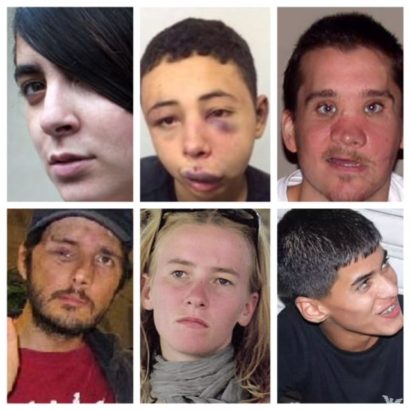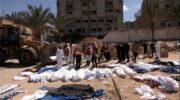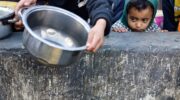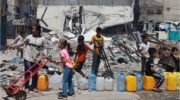PHOTO: From top left: Emily Henoschowitz, Tariq Abukhdair, Brian Avery, Tristan Anderson, Rachel Corrie, Orwah Hammad.
by Kathryn Shihadah
Sometimes it takes a tragedy to bring about change. The story of Taylor Force is one such tragedy. A young American in the prime of his life was stabbed to death in an unnecessary, unprovoked act of terrorism while in Israel on a Vanderbilt University study program. Perhaps the only good that can come of such a dreadful event is in learning a lesson to ensure that it never happen again.
Our government wants to protect its citizens wherever they are in the world, so enacting some constructive legislation would be a smart move. Unfortunately, that’s not what Congress is currently contemplating.
The US Senate is debating a bill right now—the Taylor Force Act—that would prohibit foreign aid to the Occupied Palestinian Territories unless the Palestinian Authority ends stipends to the families of those who have been killed, injured, or imprisoned. Congressional reasoning is that the so-called “Martyrs’ Fund” encourages terrorism.
The United States currently gives The Palestinian Authority a relatively small amount of aid each year (in 2016 about $300 million, roughly 8 percent of what Israel receives); the Taylor Force Act would withhold about $230 million until the Fund disappears.
It is important to understand that this fund is not an incentive for Palestinians to commit terrorism. It is a social program to provide for the families of those killed, injured, or held prisoner by hostile forces.
Most of the fund provides for those killed or injured while peacefully demonstrating, defending their property, or going about their business, and the thousands wrongly imprisoned or detained without charge. This is the program that would be shut down by the Taylor Force Act.
The fund also supports Palestinians killed by Israel while using armed resistance – in the case of Taylor Force, a knife – against a country that has one of the most powerful, advanced militaries on earth.
It is customary for members of an oppressed population to resist. In fact, it is an internationally recognized right, as stated by the UN in 1982:
The General Assembly…reaffirms the legitimacy of the struggle of all peoples for independence….and liberation from…foreign occupation by all available means, including armed struggle.
Palestinians have engaged in this struggle for independence from foreign occupation since 1967, only to find themselves losing more lives, land, and rights every day.
Undeniably, the killing of Taylor Force and other civilians is a war crime, and it is legitimate to abhor such a crime–no matter the nationality of the criminal. All countries that engage in war have killed large numbers of civilians–nevertheless, all governments provide for the families of soldiers who have died in the line of duty. This includes the Palestinian government. Enabling these families to put food on the table is not an endorsement of any act of terrorism but a humane, compassionate act. No country should be required to withhold such support.
It must also be said that the shutdown of this social program would likely result in the opposite of the intended outcome: it may lead to yet more resentment and extremism.
Proposed legislation that could make things better, not worse
Perhaps instead of the Taylor Force Act, Congress should bring some other bills to the floor—bills that would begin to address the real problems in Israel/Palestine.
Here are a few suggestions.
 We could start with the Rachel Corrie Act, prohibiting the U.S. from giving aid to countries that practice home demolitions. Rachel Corrie was killed in 2003 as she worked in Palestine with the International Solidarity Movement (ISM). Rachel, clearly visible with a neon vest and bullhorn, confronted an IDF soldier on a bulldozer, about to demolish the home of a Palestinian pharmacist, when she was run over in what is widely believed to be a deliberate act.
We could start with the Rachel Corrie Act, prohibiting the U.S. from giving aid to countries that practice home demolitions. Rachel Corrie was killed in 2003 as she worked in Palestine with the International Solidarity Movement (ISM). Rachel, clearly visible with a neon vest and bullhorn, confronted an IDF soldier on a bulldozer, about to demolish the home of a Palestinian pharmacist, when she was run over in what is widely believed to be a deliberate act.
The incident was investigated by the Israeli army and deemed “a regrettable accident” (as is often the case when Israelis are violent). An IDF spokesman explained that the group of protesters that day were “acting very irresponsibly, putting everyone in danger.” Interestingly, peacekeepers were the danger, not the demolition team at the home of an innocent man and his family.
The Rachel Corrie Act might discourage Israel from this ongoing, illegal practice. (Over 48,000 homes and other structures have been destroyed since the occupation began in 1967.) Rachel Corrie was from Washington, so Senators Patty Murray (D) and Maria Cantwell (D) from Washington should consider sponsoring such a bill. It might encourage Israel to desist from the collective punishment practice of demolishing homes.
Another idea for legislation would be the Brian Avery Act. This bill would prohibit the U.S. from giving aid to countries that use curfews as a form of collective punishment. Brian Avery was shot in the face in an unprovoked attack by Israeli soldiers during a curfew in the West Bank city of Jenin.
the U.S. from giving aid to countries that use curfews as a form of collective punishment. Brian Avery was shot in the face in an unprovoked attack by Israeli soldiers during a curfew in the West Bank city of Jenin.
Curfews often last for days or weeks, sometimes even months, with only brief respites to obtain food. Sometimes the interludes are cut short without warning, and then enforced punitively. Palestinians have often been killed or injured during curfews; many more have their education disrupted, lose their jobs, or go out of business; the health of others suffers due to lack of medication or medical treatment. In addition, curfews often include home invasions and detentions.
Brian Avery, an American, was acting as an international observer during the curfew as he, like Rachel Corrie, worked for the ISM. He was wearing a reflective vest and had his hands up, but he was shot and seriously injured. His injuries were too severe to handle in the local hospital, but Israel spent several hours in negotiation before allowing him to be transported to an Israeli hospital. Even still, the ambulance was stopped at the border for an hour.
The investigation into this incident was completely botched and Brian’s injury was deemed “an unfortunate incident” because according to IDF Colonel Dan Hefetz, ISM activists “knowingly endanger themselves.” The Brian Avery Anti-Curfew Act might stop this dangerous form of collective punishment from causing any more tragedies. Brian came to Palestine from New Mexico, so Martin Heinrich (D) and Tom Udall (D) should consider sponsoring the bill. It could save the lives, careers, businesses, and health of many Palestinians.
Another possible piece of legislation would be the Emily Henoschowitz Act, which would limit aid to countries that illegally besiege another country or practice piracy on the high seas. Emily Henoschowitz is an Israeli-American who got involved with ISM in 2010 when she found the Palestinian situation too compelling to ignore.
 While Emily was in Palestine, the Gaza Freedom Flotilla, loaded with humanitarian aid and construction materials for Gaza, was attacked by Israel. Nine Turkish citizens (one also an American citizen) were killed. When Emily heard about this incident, she joined in a demonstration. She was hit in the face with a tear gas canister.
While Emily was in Palestine, the Gaza Freedom Flotilla, loaded with humanitarian aid and construction materials for Gaza, was attacked by Israel. Nine Turkish citizens (one also an American citizen) were killed. When Emily heard about this incident, she joined in a demonstration. She was hit in the face with a tear gas canister.
Emily resents the attention she has gotten over her injury, compared to hordes of Palestinians who are injured or killed daily without notice. “I’m white, I’m Jewish, I’m an Israeli citizen and American,” she points out. “When I’m hit by tear gas there are articles, the Israeli government gets involved. When Palestinians are hit, who gives a s***?”
The root of this issue is not Emily’s presence at a demonstration or even the act of piracy against the Freedom Flotilla. The root is the siege of Gaza—now in its tenth year—that necessitated international intervention. The siege by Israel has sealed off Gaza by land, sea, and air, and destroyed the region’s economy. Combined with “wars” against the people of Gaza, contaminated water, and electricity shortages—all perpetrated by Israel—the siege is the real problem. The Emily Henoschowitz Act might cause Israel to finally pull back its brutal blockade. Emily is from Maryland, so Senators Ben Cardin (D) and Chris Van Hollen (D) should bring some accountability by sponsoring this bill.
The Tristan Anderson Act would limit U.S. aid to countries that restrict other countries’ freedom of movement by building barriers. In 2009, Tristan Anderson was in the town of Ni’lin, at one of the weekly demonstrations against the West Bank Barrier. Most of Ni’lin’s residents get their income from agriculture, and the wall was set to cut farmers off from 1/3 of their land.  Israeli Border Police rarely allow such protests occur without reprisal. ISM describes the incident: “Tristan was shot in the face from about 60 meters away, crushing his skull, blinding him in one of his eyes, and sending shards of bone penetrating deep into his brain.” This occurred after the demonstration had finished.
Israeli Border Police rarely allow such protests occur without reprisal. ISM describes the incident: “Tristan was shot in the face from about 60 meters away, crushing his skull, blinding him in one of his eyes, and sending shards of bone penetrating deep into his brain.” This occurred after the demonstration had finished.
Investigation showed that at the time of the incident, Tristan was half a mile from the wall and had not been near it for hours. Why he was shot with a tear gas canister is not clear—no one has given an explanation. Meanwhile, eight years later, “Tristan continues to require around the clock care because of cognitive impairment and physical disability. He is also paralyzed on half his body and uses a wheelchair.”
The “good” news is that Israel has since begun using a less lethal method of crowd control in Ni’lin. It is nicknamed “skunk water,” [see this video] and Reuters paints a vivid picture of the practice: “Imagine taking a chunk of rotting corpse from a stagnant sewer, placing it in a blender and spraying the filthy liquid in your face. Your gag reflex goes off the charts and you can’t escape, because the nauseating stench persists for days.”
In an official statement that denies freedom of speech and assembly to both Palestinians and visitors, the IDF announced its regret that “foreign nationals co-operate with violent rioters against the building of the security fence, whose purpose is saving the lives of Israeli citizens. [Anyone] who illegally participates in a violent demonstration takes upon himself the risk of personal harm during the dispersal of these disturbances.” The Tristan Anderson Anti-Barrier Act could give Israel the motivation to tear down that wall and so that Palestinians can enjoy the freedom that all people deserve. Tristan is from California, and his senators, Dianne Feinstein (D) and Kamala Harris (D) ought to sponsor this bill in order to encourage the deconstruction of the Wall.
Congress might also consider a Tariq Abukhdeir Act, which would limit U.S. funding of countries that imprison and/or detain minors. Tariq Abukhdeir is an American citizen who was visiting his family in Palestine for the summer. His cousin Mohammed had been burned alive in a horrific act just a day earlier by Israeli settlers.
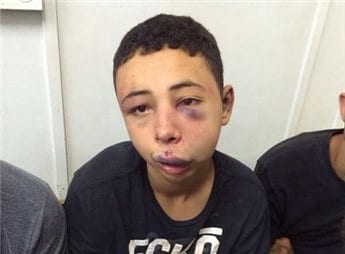 In the summer of 2014 Tariq, then 15 years old, was severely beaten by two Israeli police, then dragged and repeatedly kicked before being arrested for allegedly throwing stones. He adamantly denied the charge, but remained in prison for several days. In spite of a video of the assault, “showing at least two Israelis methodically delivering blows to Tariq’s limp body,” only one officer was prosecuted. He was found guilty and sentenced to 45 days of community service.
In the summer of 2014 Tariq, then 15 years old, was severely beaten by two Israeli police, then dragged and repeatedly kicked before being arrested for allegedly throwing stones. He adamantly denied the charge, but remained in prison for several days. In spite of a video of the assault, “showing at least two Israelis methodically delivering blows to Tariq’s limp body,” only one officer was prosecuted. He was found guilty and sentenced to 45 days of community service.
This case got wide attention because Tariq is an American citizen. At least 8,000 Palestinian children have been arrested since 2000 and placed in a military detention system “notorious for the systematic ill-treatment and torture of Palestinian children.” Most are accused of throwing stones, which carries a potential maximum sentence of 10 to 20 years.
As for adults, If Americans Knew reports, “Since the Israeli occupation of Palestinian territory in 1967, more than 800,000 Palestinians have been detained under Israeli military orders in the occupied Palestinian territory. This number constitutes approximately 20 percent of the total Palestinian population in the oPt and as much as 40 percent of the total male Palestinian population.”
The United States should not tolerate this excessive incarceration–especially of minors. The Tariq Abukhdeir Act might cause Israel to think twice before imprisoning children. Bill Nelson (D) and Marco Rubio (R) of Florida, Tariq’s home state, need to lead the way by sponsoring this bill.
And finally, Congress should propose the Orwah Hammad Act, which would cut off funding to any country that encourages the practice of building of settlements inside other countries. Orwah Hammad, an American citizen, was 14 years old in 2014 when he participated in a weekly demonstration in the town of Silwad. He was shot in the neck with a live bullet, and died that night. During his funeral, IDF soldiers fired rubber-coated steel bullets and tear gas.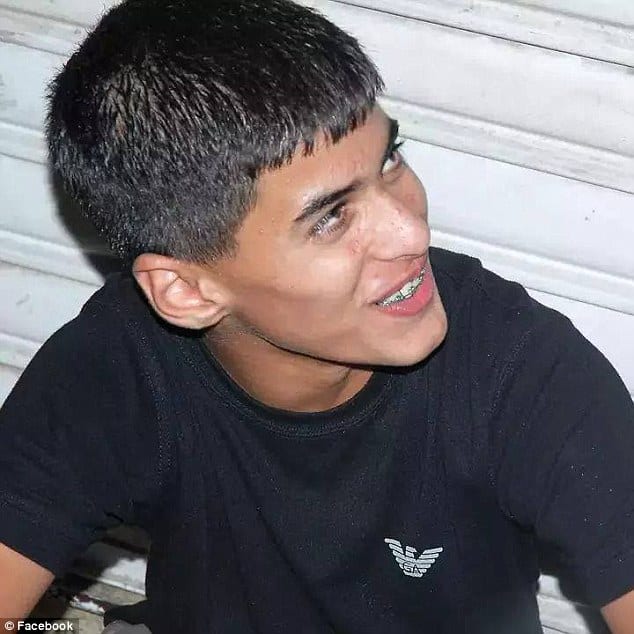
Silwad residents have been fighting for their property and livelihood for 20 years, since Israel confiscated much of their farmland to build a settlement. This is an illegal act under international law.
International law hasn’t stopped Israel from building over 250 settlements all over the West Bank, with approximately 500,000 Israeli settlers. In addition to the built-up areas, Jewish-only roads and closed military zones—also illegal—give Israel control of fully fifty percent of the West Bank. The Orwah Hammad Anti-Settlement Act might cause Israel to rethink the wisdom of breaking yet another international law. Senators John N. Kennedy (R) and Bill Cassidy (R) of Orwah’s home state of Louisiana should sponsor the bill.
The stories of Rachel, Brian, Emily, Tristan, Tariq, and Orwah have been heard around the world because they are—or were—American citizens. A handful of European advocates for Palestinians have also been killed or injured, and have also made the papers. A number of Israelis have also tragically died or been hurt. But thousands of Palestinian children, women, and men have died; tens of thousands have been injured; hundreds of thousands live in poverty; millions are without hope and without help.
The Taylor Force Act would lead to more suffering for Palestinians, and more boldness on the part of Israel, as US complicity would only reinforce Israel’s current actions. Home demolitions, detention of minors, the West Bank barrier, settlements, curfews, and skunk water would all continue unchecked.
These illegal practices and collective punishment methods only make Palestinians angrier and more hopeless, resulting in an ever-escalating cycle of violence.
The Foreign Assistance Act, which “prohibits…assistance to any country which engages in a consistent pattern of gross violation of internationally recognized human rights,” sounds like it can be applied to Israel. Why are we forking over $10 million a day, $3.5 billion a year, to the Israeli government?
The answer is in the fine print: “except when extraordinary circumstances exist which necessitate continuation of such assistance or the national interest of the United States requires such assistance.” Our leaders seem to think Israel’s continued human rights abuses are in our best interest.
How is a system of oppression and illegal occupation, that births resentment and violence, good for America? Or Israel? Or anyone?
Kathryn Shihadah is a staff writer for If Americans Knew.
Our operations are funded solely by generous individuals like you. Your contribution will help us continue shining a light on the Israel/Palestine situation and the U.S. connection.
DONATERELATED ARTICLES:
Billionaire Haim Saban backs bill slashing funds to Palestinian Authority (Taylor Force Act)

